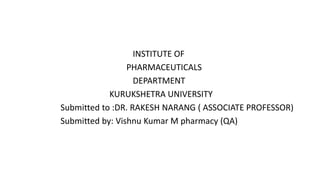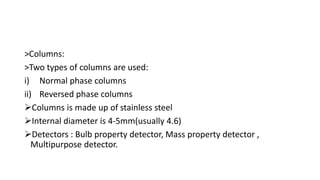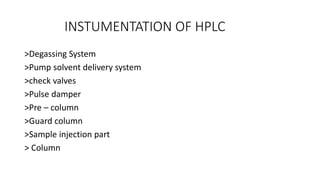hplc.pptx
- 1. INSTITUTE OF PHARMACEUTICALS DEPARTMENT KURUKSHETRA UNIVERSITY Submitted to :DR. RAKESH NARANG ( ASSOCIATE PROFESSOR) Submitted by: Vishnu Kumar M pharmacy (QA)
- 3. HPLC> Is the powerful tool in the development and production of pharmaceuticals. High performance Liquid chromatography is an incredible useful analytical technique with a broad range of applications . HPLC involves a column of adsorbent material (Such as silica beads ) through which a sample is passed under pressure . .Each component of the sample Mixture will interact differently with material in the column and as such have a different flow rate . As a result , the various components will leave the Column at different time and can be collected separately .
- 4. PRINCIPAL OF HPLC .The principal of HPLC is to force the sample through the Column of the stationary phase by pumping the mobile phase at high pressure . The to be analyzed is introduced small volume to the stream of mobile phase and the sample molecules are retained by specific chemical and physical interaction with the material of the stationary phase as it travels the length of the column . The amount of retention depends on a) The nature of the sample b) The nature of the composition of the stationary phase and c) The nature of the composition of the mobile phase
- 5. DETAILS >Mobile phase : commonly used solvent are acetonitrile ,methanol and water . .Acidifier , buffer solution are used for better separation. >Stationary phase: .particle size range is 3.5= 10Um 1)two type of Stationary phase : Normal phase : silica gel Reversed phase :ODS silica gel
- 6. >Columns: >Two types of columns are used: i) Normal phase columns ii) Reversed phase columns ÔÉòColumns is made up of stainless steel ÔÉòInternal diameter is 4-5mm(usually 4.6) ÔÉòDetectors : Bulb property detector, Mass property detector , Multipurpose detector.
- 7. INSTUMENTATION OF HPLC >Degassing System >Pump solvent delivery system >check valves >Pulse damper >Pre – column >Guard column >Sample injection part > Column
- 8. DESAGGING SYSTEM ÔÉòSparging / Bubbling >vacuum filtration >Ultra sonication 2) Pump solvent delivery system: >The pump are used to pass mobile phase through the Column at high pressure because the particles that are used pack HPLC column are small enough ie : <50um and also particle size of packing material is 5-10um
- 9. PUMPS >Generation of pressure upto 5000psi >flow rate ranging from 0.1 to 100ml/min >It should be composition resistant and give a pulse free Out put 2) Pumps are thus categories into i) Mechanical pumps .Displacement pump .Reciprocating pumps ii) Pneumatic pumps
- 10. MECHANICAL PUMPS Displacement pump: >working: I ) Work on the principal of Positive solvent pressure Ii ) Consist of screw or plunger Which revolve continuously driven by motor . Iii ) Rotatory motion provides continuous movement of the mobile phase which is propelled by the revolving screw at greater speed and pushes solvent through small needle like outlet . iii) Consist of large syringe like chamber of capacity 250-500 ml.
- 11. RECIPROCATING PUMPS >Working: I) Pressure from gas cylinder delivered through a large piston drivers the mobile phase . II) Pressure on the solvent is proportional to the ratio of piston usually 50:1. III ) Check Valves : .they are used to control the flow of solvent and back pressure. IV ) pulse damper : Pulse are used to dampen or reduce the reduce observed from the way baseline caused by pumps.
- 12. APPLICATION OF HPLC I) Quality control testing of drugs II) In qualitative and quantitave analysis III) Separation and control of impurities IV) In analysis of biological fluids V) Stability studies VI) Industrial application VII) Stability studies ex : Acyclovir VIII) Determination of synthetic intermediate Ex : atenolol











